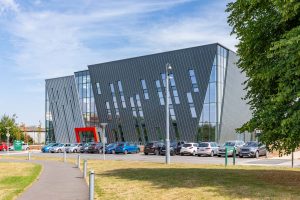Aluprof Excel in Passivhaus Projects

Passivhaus design is a set of standards and design principles to achieve exceptional energy efficiency, significantly reducing heating and cooling demands in buildings.
By employing rigorous insulation standards, airtight construction and high-performance windows, Passivhaus buildings minimise energy loss and maintain stable indoor temperatures. The use of heat recovery ventilation systems ensures that fresh air is continuously supplied, whilst retaining warmth in winter and coolness in summer. This leads to dramatically lower energy bills and a reduced carbon footprint. Additionally, the controlled indoor environment enhances occupant comfort, eliminating drafts, temperature fluctuations, and cold bridging.
Specifying Passivhaus windows, doors and facades from Aluprof contributes to sustainability by reducing reliance on fossil fuels and supporting the transition to net-zero carbon emissions. The methodology prioritises efficient use of materials, often incorporating sustainable and recycled options. Beyond environmental benefits, Passivhaus buildings promote superior indoor air quality through continuous ventilation and effective pollutant filtration. This is particularly beneficial for occupants with respiratory issues or allergies. The focus on thermal comfort and noise reduction further enhances the well-being of occupants, making Passivhaus a holistic approach to healthy and sustainable living spaces.
Aluprof was the first systems company in the UK to design and supply Passivhaus certified aluminium framed glazing systems and currently has the widest range of Passivhaus Trust certified aluminium windows, doors and curtain wall systems. Utilising low-carbon aluminium helps reduce embodied carbon emissions during the production phase, while the thermally efficient products further lower operational carbon emissions throughout the building’s life by reducing energy demand. Sustainability is further enhanced as quality methods of construction with high quality finishes, well specified and designed products supplied by Aluprof, can offer many decades of extended service life.
Some of the projects supplied by Aluprof in recent years include the following high profile buildings:
The RAD Building (GERA Building) is a 2,500 sqm Passivhaus certified research facility for the University of Nottingham, providing laboratory, office and support accommodation for the UK Government Energy Research Acceleration Initiative, known as the ‘RAD’ Building (Research Acceleration & Demonstration) on the Jubilee campus. The building achieves a BREEAM Excellent rating and includes extensive Passivhaus measures to reduce energy requirements. Aluprof’s high performance TT50 curtain wall & MB104 window and door systems have been used throughout the building offering very high levels of insulation. On completion the building has been extensively tested and has gained the coveted Passivhaus certification.
Purdown View at University of Western England (UWE) Bristol, is a remarkable milestone in sustainable living, featuring more than 900 bedrooms distributed across three striking six-story buildings. With a total floor area of 21,000 sqm, Purdown View is distinguished as the largest certified Passivhaus development in the United Kingdom to date. It was designed by Stride Treglown and uses Aluprof’s high performance TT50 curtain wall & MB104 window and door systems, the project was fabricated and installed by DenvalCo.
The Greenhaus project stands as the largest Passivhaus affordable housing initiative in the North West. The development was completed for the English Cities Fund (ECF), a collaborative effort involving Muse, Legal & General, and Homes England, in partnership with Salix Homes, a Housing Association in Salford, and with the support of Salford City Council. Greenhaus features 96 highly sustainable and affordable residences within a nine-storey structure located on Chapel Street in Salford. The project, designed by Buttress architects and constructed by Eric Wright Construction, has received official certification from the Passivhaus-Institut, the organisation dedicated to promoting and certifying this internationally recognised building standard.
Voreda House in Penrith has undergone a significant transformation from its previous role as an NHS office to become the council’s energy-efficient northern anchor building. This facility is notable for being the first retrofit office in the UK to achieve the Passivhaus EnerPHit standard, with projected energy savings of 85%. This initiative aligns with the council’s dedication to minimising its carbon footprint and taking a leading role in the pursuit of carbon neutrality.
The British Antarctic Survey (BAS) undertakes groundbreaking research and maintains a Research Station located 67º south on Adelaide Island which was established in 1975. Known as Rothera, the busy station is used as a hub for other countries working in the area, offering a landing strip and wharf. The site has continued to develop over the years and in 2018 work began on the new Discovery Building, named to commemorate the discovery of Antarctica 200 years ago by the British naval officer Edward Bransfield in 1820. High thermal performance windows specified on the project have been provided by Aluprof. The MB-86 ST window and door system has been designed to offer outstanding insulation properties. Offered in three varieties, ST, SI and AERO the MB-86 was the first ever aluminium system to employ silica aerogel, a nano-porous material that has a very high proportion of free void volume compared to conventional solid materials. Aerogel’s high pore volume, low solid content, and its ‘torturous path amorphous structure’ offer very low values of thermal conductivity.



